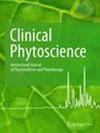Ameliorative role of diets fortified with Artocarpus altilis in a Drosophila melanogaster model of aluminum chloride-induced neurotoxicity
引用次数: 0
Abstract
Artocarpus altilis (breadfruit) belongs to the family Moraceae. Artocarpus altilis possesses antioxidative, anti-inflammatory, and anti-proliferative properties. Aluminum (Al) is extensively utilized for consumer products, cooking utensils, pharmaceuticals, and industries. Indication for the neurotoxicity of Al is investigated in various studies, notwithstanding the precise mechanisms of Al toxicity are yet to be fully elucidated, and, which requires novel therapy. In this study, we determined the ameliorative role of Artocarpus altilis on aluminum chloride-induced neurotoxicity in Drosophila melanogaster. Varying concentration of the extract were used to formulate diets for 6 groups of flies. Group 1 contained basal diet, group 2 contained basal diet and aluminium chloride (AlCl3), group 3 contained basal diet + 0.1% unseeded breadfruit (UBF), group 4 contained basal diet + 1% unseeded breadfruit, group 5 and 6 contained basal diet + AlCl3 + 0.1% and 1% unseeded breadfruit. Assays such as acetylcholinesterase activity, malondialdehyde (MDA) concentration level, catalase activity, and superoxide dismutase (SOD) activity were carried out after 7 days of exposure respectively. The results showed low activity of acetylcholinesterase activity and MDA level and high catalase and SOD activity in the pretreated and post-treated flies with Artocarpus altilis compared to the normal and negative control respectively. Taken together, Artocarpus altilis is a promising prophylactic, antiacetylcholinesterase, and antioxidant plant in the prevention, management and treatment of neurodegenerative diseases.在黑腹果蝇氯化铝诱导的神经毒性模型中,添加阿尔托卡普斯的膳食具有改善作用
面包果(Artocarpus altilis)属于桑科。面包树具有抗氧化、抗炎和抗增殖的特性。铝(Al)被广泛用于消费品、烹饪用具、药品和工业。尽管铝毒性的确切机制尚未完全阐明,但各种研究都对铝的神经毒性进行了调查,这就需要新的疗法。在本研究中,我们确定了阿尔泰利树对氯化铝诱导的黑腹果蝇神经毒性的改善作用。我们使用不同浓度的提取物为 6 组果蝇配制食物。第1组为基础饲料,第2组为基础饲料和氯化铝(AlCl3),第3组为基础饲料+0.1%无籽面包果(UBF),第4组为基础饲料+1%无籽面包果,第5组和第6组为基础饲料+AlCl3+0.1%和1%无籽面包果。暴露 7 天后,分别进行了乙酰胆碱酯酶活性、丙二醛(MDA)浓度水平、过氧化氢酶活性和超氧化物歧化酶(SOD)活性等检测。结果表明,与正常对照组和阴性对照组相比,用阿尔托卡普树预处理和后处理的苍蝇乙酰胆碱酯酶活性和 MDA 含量较低,而过氧化氢酶和 SOD 活性较高。综上所述,阿尔泰利斯是一种很有前景的预防、抗乙酰胆碱酯酶和抗氧化植物,可用于预防、管理和治疗神经退行性疾病。
本文章由计算机程序翻译,如有差异,请以英文原文为准。
求助全文
约1分钟内获得全文
求助全文
来源期刊
自引率
0.00%
发文量
18
审稿时长
13 weeks
期刊介绍:
Clinical Phytoscience is an international, peer-reviewed, interdisciplinary, and open access journal publishing high quality research articles on clinical evidence and use of medicinal plants in the development of efficient and well tolerated phytotherapy. Clinical Phytoscience focuses on phytotherapy, looking at proof of concept, efficacy and safety, to be established “at eye level” compared to pharmacotherapy. The emphasis lies on application oriented topics (efficacy and safety of phytotherapy in a specific indication, including its need and acceptance by the patient). The scientific results published in the journal should contribute to the recovery and maintenance of human health by phytotherapy. Clinical Phytoscience will publish high-quality evidence-based clinical studies and relevant pharmacological studies. Key areas of interest are: -Upper and lower airways, ENT and pneumology -Gynecology -Urology -Nephrology Pediatrics -Intestinal tract -Hepatology -Diabetes/metabolic Syndrome -Immunology and microbiology -Hygiene -Analytics

 求助内容:
求助内容: 应助结果提醒方式:
应助结果提醒方式:


